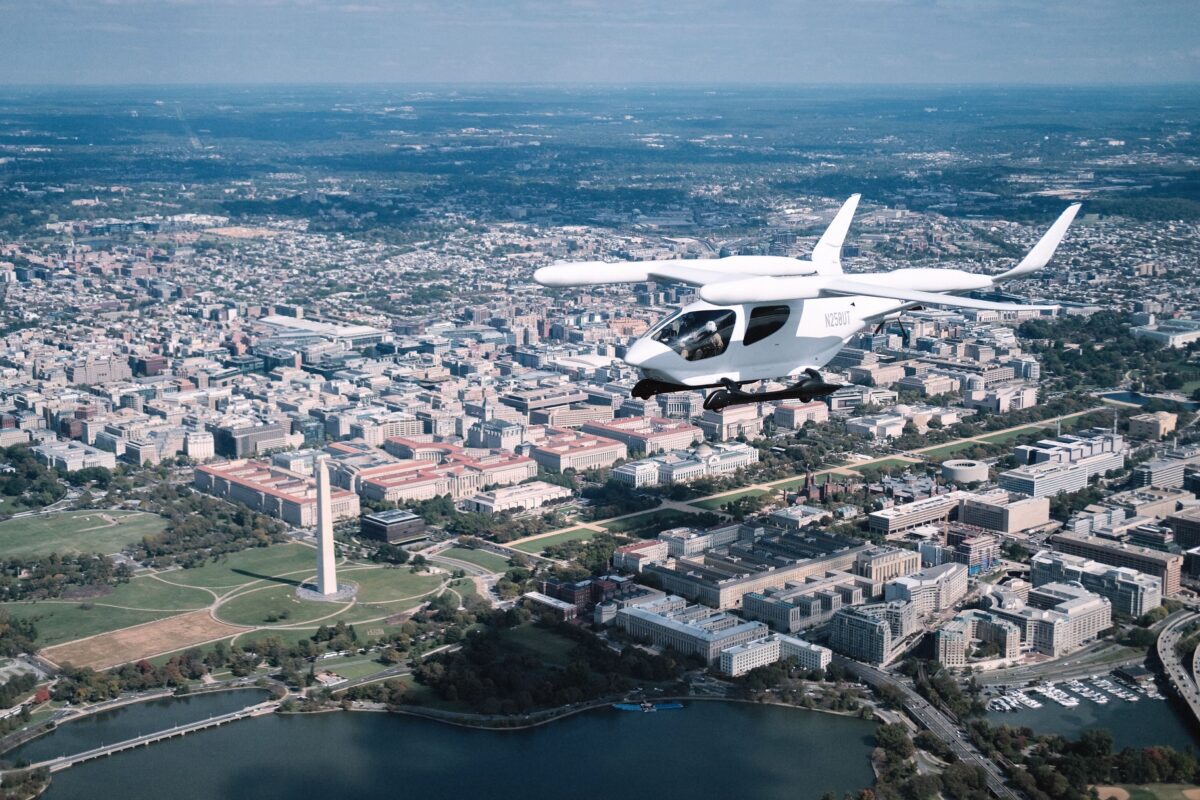A second U.S. airbase gets an all-electric air taxi for testing
By Paul Brinkmann|October 26, 2023
BETA’s prototype was flown from Vermont to Florida in multiple legs
This story has been updated to correct the number of passengers that the ALIA aircraft can carry.
The U.S. Air Force intends to test cargo delivery, medical and personnel transport with the latest electric air taxi to be temporarily stationed at a U.S. military base, an ALIA airplane built by Vermont-based BETA Technologies, which landed today at Duke Field, an auxiliary facility for Eglin Air Force Base in northern Florida.
Five pilots took turns flying the ALIA to Eglin from Vermont through 11 states over 15 days in 19 legs as part of BETA’s test flight program. One of BETA’s test pilots, Nate Moyer, is a former experimental test pilot with the Air Force who is staying at Eglin to be a part of the flight tests.
The company flew the ALIA through Washington, D.C. airspace to land at Joint Base Andrews in Maryland on one of the legs. The company said that was the first all-electric aircraft cleared to fly into the capital’s Flight Restricted Zone.
The prototype ALIA delivered to Eglin takes off conventionally on a runway, not vertically like many electric air taxis. According to Moyer, that makes the test flight campaign at Eglin a little easier to plan, since flights will mirror actual missions the Air Force already conducts withcargo planes.
“We’ll be testing tradeoffs between range and payload, because like any aircraft every ounce of weight reduces range, and vice versa,” Moyer told me by phone. “We’ll be doing some cross country flights to other bases in north Florida.”
The company also has installed one of its electric charging stations at Duke Field. The aircraft and its flight test team will remain at Duke through at least January to work with the 413th Squadron of the Air Force.
ALIA is designed to carry a pilot and five passengers, but there are no seats for passengers in the test plane. Instead, weights will be carried on some flights to simulate passengers and other flights will demonstrate medical transport.
“We will actually carry stretchers and dummies to simulate patients for some of the medical flights tests,” Moyer said.
As one of the pilots on the journey to Eglin, Moyer said the journey was without drama.
“I worked on special operations mobility issues in Africa for the Air Force, and I can tell you my main concern was always reliability,” he said.
One of the Air Force officers expecting to fly the plane at Duke Field is Maj. Riley Livermore of the 413th Squadron, who plans to collect information about the aircraft’s performance to help the Air Force draft policies for novel electric air taxis.
Livermore told me the Air Force already has learned quite a bit about installing an electric charging station on a U.S. military base, and has documented hurdles that were overcome to make it happen.
“We’re not just putting a car charger up on a field, right? This is part of a much broader initiative. There’s some education going on within the base that we are trying to accomplish now,” he said.
Livermore says the Air Force is interested in how electric air taxis can enable “agile combat employment” which relies on smaller vehicles to move equipment and personnel quickly.
“In broad brushstrokes, I don’t want to wait to fill up a C-130 transport if I need to move something right now. It’s sort of similar to the agility companies like Amazon or Walmart are looking for now,” he said.
Joby Aviation of California in September became the first developer of an all-electric air taxi to station an aircraft at a U.S. military base when it delivered one of its S4s to Edwards Air Force Base, California. But the S4 is an eVTOL, or electric vertical takeoff and landing craft, so that makes BETA’s ALIA the first electric conventional takeoff and landing, or CTOL, air taxi to be stationed at a U.S. base.
“I think the cool thing about BETA coming here is having it available to touch and see it flying, and not just watching a YouTube video,” Livermore said.





